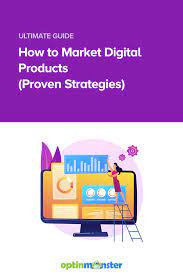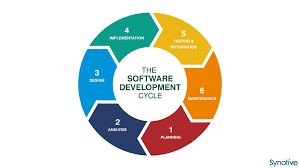The Power of Digital Product Marketing
In today’s digital age, marketing your products online is essential for reaching a wider audience and driving sales. Digital product marketing involves promoting and selling products through various online channels such as social media, email campaigns, search engine optimization (SEO), and online advertising.
Key Strategies for Successful Digital Product Marketing:
- Identify Your Target Audience: Understanding your target audience is crucial for creating effective marketing campaigns. Conduct market research to identify their needs, preferences, and online behavior.
- Create Compelling Content: Engaging content plays a key role in attracting and retaining customers. Use high-quality images, videos, and written content to showcase your products effectively.
- Optimize for Search Engines: Implement SEO strategies to improve your website’s visibility on search engine results pages. Use relevant keywords, meta tags, and backlinks to drive organic traffic to your site.
- Leverage Social Media: Utilize popular social media platforms like Facebook, Instagram, and Twitter to promote your products. Engage with your audience through regular posts, contests, and influencer partnerships.
- Implement Email Marketing: Build an email list of potential customers and send targeted campaigns to promote your products. Personalize emails based on customer preferences and behaviors to increase conversion rates.
- Monitor Performance Metrics: Track key performance indicators (KPIs) such as website traffic, conversion rates, click-through rates, and ROI to measure the success of your digital marketing efforts. Use analytics tools to gain insights into customer behavior and optimize your strategies accordingly.
The Future of Digital Product Marketing
As technology continues to evolve, digital product marketing will become even more sophisticated. Emerging trends such as artificial intelligence (AI), virtual reality (VR), and voice search will revolutionize the way businesses promote their products online.
To stay ahead of the competition, businesses must adapt to these changes by embracing innovative digital marketing strategies and technologies. By leveraging the power of digital product marketing, businesses can reach a global audience, drive sales growth, and build long-lasting relationships with their customers.
Six Key Advantages of Digital Product Marketing: Expanding Global Reach, Maximizing Cost-Efficiency, Enhancing Targeted Advertising, Utilizing Real-Time Analytics, Boosting Engagement, and Elevating Brand Visibility
- Global Reach
- Cost-Effective
- Targeted Advertising
- Real-Time Analytics
- Increased Engagement
- Brand Visibility
Six Challenges of Digital Product Marketing: Navigating Competition, Change, and Technical Demands
- High competition
- Constant changes
- Technical expertise required
- Data privacy concerns
- Ad fatigue
- Dependency on technology
Global Reach
Digital product marketing offers businesses the invaluable advantage of global reach by transcending geographical limitations. Through online channels such as social media, search engines, and email campaigns, companies can effectively showcase their products to a worldwide audience. This capability to connect with potential customers across different regions and time zones not only expands market reach but also opens up new opportunities for growth and brand recognition on a global scale. By leveraging digital product marketing strategies, businesses can break free from geographical barriers and tap into diverse markets with ease and efficiency.
Cost-Effective
Digital product marketing offers a significant advantage in terms of cost-effectiveness when compared to traditional marketing methods. By leveraging online channels such as social media, email campaigns, and search engine optimization, businesses can reach a larger audience at a fraction of the cost of traditional advertising. This affordability allows businesses to allocate their marketing budget more efficiently and effectively, ultimately leading to a higher return on investment. With digital product marketing, companies can maximize their marketing efforts while minimizing costs, making it a valuable strategy for businesses of all sizes.
Targeted Advertising
With digital marketing tools, businesses can leverage the pro of targeted advertising to reach specific demographics and interests with precision. By tailoring their campaigns to resonate with the right audience segments, companies can significantly enhance the effectiveness of their marketing efforts. This targeted approach allows businesses to deliver personalized messages and offers that are more relevant and engaging to potential customers, ultimately driving higher conversion rates and maximizing return on investment.
Real-Time Analytics
With real-time analytics in digital product marketing, businesses gain the valuable ability to track the performance of their campaigns instantly. This feature enables them to make quick adjustments and optimizations based on real-time data, leading to better results and more effective marketing strategies. By monitoring key metrics in real-time, businesses can identify trends, measure campaign effectiveness, and promptly respond to changing market conditions, ultimately enhancing their overall marketing performance and maximizing their return on investment.
Increased Engagement
Digital product marketing offers the significant advantage of increased engagement with customers. By leveraging interactive content, social media platforms, and personalized messaging, businesses can establish meaningful connections with their target audience. This engagement not only fosters brand loyalty but also allows for valuable insights into customer preferences and behaviors. Through active participation and tailored communication, businesses can create a more personalized and engaging experience for customers, ultimately driving brand awareness and enhancing customer relationships.
Brand Visibility
By leveraging digital product marketing, businesses can significantly enhance their brand visibility and establish a robust online presence in today’s competitive digital landscape. Through strategic utilization of various online channels such as social media, search engine optimization, email marketing, and online advertising, companies can effectively reach a broader audience and solidify their brand identity. This increased visibility not only helps businesses stand out among competitors but also fosters greater brand recognition and credibility among consumers in the digital realm.
High competition
In the realm of digital product marketing, a significant challenge that businesses face is the high level of competition. The digital landscape is overflowing with competitors vying for consumers’ attention, making it increasingly difficult for brands to distinguish themselves and stand out from the crowd. With numerous companies offering similar products and services, businesses must devise innovative strategies to capture the target audience’s interest and differentiate themselves in a saturated market. This intense competition underscores the importance of implementing unique and compelling marketing tactics to effectively engage consumers and secure a competitive edge in the digital arena.
Constant changes
One significant drawback of digital product marketing is the constant changes in trends and algorithms. The dynamic nature of the digital landscape demands businesses to stay agile and adapt swiftly to new developments. This continuous evolution can be challenging for businesses, as they need to constantly reassess their strategies and tactics to remain competitive in the ever-changing online environment. Failure to keep up with these rapid changes may result in missed opportunities and decreased effectiveness of marketing efforts.
Technical expertise required
One significant drawback of digital product marketing is the technical expertise required for its successful implementation. Many businesses may lack the necessary technical skills and knowledge needed to navigate the complexities of online marketing strategies effectively. From search engine optimization to data analytics and website optimization, digital product marketing demands a level of technical proficiency that can be challenging for some organizations to acquire and maintain. This barrier can hinder businesses from fully leveraging the potential of digital marketing channels and reaching their target audience with impactful campaigns.
Data privacy concerns
Data privacy concerns are a significant con of digital product marketing. Collecting and utilizing customer data for marketing purposes raises ethical and legal issues related to privacy. Customers are increasingly wary of how their personal information is being used by businesses, leading to concerns about data breaches, unauthorized access, and misuse of data. As regulations around data protection continue to evolve, businesses must prioritize transparency and compliance to maintain trust with their customers and avoid potential legal repercussions. Balancing the benefits of personalized marketing with respect for customer privacy is essential in navigating the complex landscape of digital product marketing.
Ad fatigue
Ad fatigue is a significant drawback of digital product marketing, as it can result in consumers feeling overwhelmed and disengaged due to the constant bombardment of online advertisements. The repetitive nature of ads across various online platforms can lead to a decline in consumer interest and responsiveness, ultimately diminishing the effectiveness of marketing campaigns. This phenomenon highlights the importance of implementing targeted and strategic advertising approaches to avoid overwhelming consumers and ensure that marketing messages resonate with the intended audience.
Dependency on technology
A significant drawback of digital product marketing is the dependency on technology, which can pose challenges and setbacks for businesses. Technical issues, such as website downtime or sudden algorithm changes by search engines or social media platforms, have the potential to disrupt digital marketing efforts and significantly impact results. These unforeseen circumstances can lead to decreased online visibility, reduced website traffic, and ultimately hinder the effectiveness of marketing campaigns. Businesses must remain vigilant and prepared to address technical issues promptly to minimize the negative impact on their digital marketing strategies.



